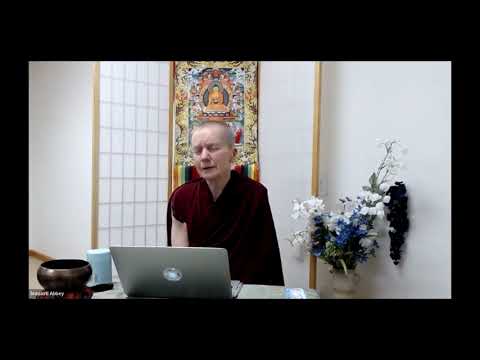Transcendental dependent origination
72 Samsara, Nirvana, and Buddha Nature
Part of an ongoing series of teachings (retreat and Friday) based on the book Samsara, Nirvana, and Buddha Nature, the third volume in The Library of Wisdom and Compassion series by His Holiness the Dalai Lama and Venerable Thubten Chodron.
- Dependent origination and impermanence
- Forward and reverse purified flow of the twelve links
- Knowledge of destruction of all pollutants, liberation and preceding factors
- Duhkha as the cause leading to faith
- Delight, four truths and ethical conduct
- Eleven virtuous factors and three higher training
- Joy, bliss, pliancy and concentration
- Mental pliancy and physical pliancy
- Refined states of mind as practitioner progresses
- Cultivating serenity and dhyanas
Samsara, Nirvana, and Buddha Nature 72: Transcendental Dependent Origination (download)
Contemplation points
- We often see impermanence as a negative thing, however, “because things are impermanent and conditioned, they can also change for the better.” Make some examples of things that change for the better from your own experience. Why do you think we focus on the negative aspects of change?
- Spend some time reviewing the Twelve Links and steps of Transcendental Dependent Origination combined in order both forwards and backwards. Does this give you a better understanding of how we attain liberation?
- What first interested you in spirituality? Was it that you were dissatisfied in your life somehow? Did you think there must be more than this? Why is this realization, that of dukkha, the first step before beginning the eleven steps of Transcendental Dependent Origination? Why is it the proximate cause for faith? What is your personal experience of this?
- Take a deeper look into how you distract yourself from dukkha. How often do you find yourself in those situations? What are some ways you can interrupt this need to distract yourself and instead work towards a sense of inner peace?
- Have you ever considered that ethical conduct overcomes low self-esteem? What is the connection between the two?
- Consider how faith gives rise to delight, which gives rise to joy, which gives rise to pliancy, which gives rise to bliss, and then concentration. Spend some time thinking about the characteristics of each that allows the subsequent step to arise.
Venerable Thubten Chodron
Venerable Chodron emphasizes the practical application of Buddha’s teachings in our daily lives and is especially skilled at explaining them in ways easily understood and practiced by Westerners. She is well known for her warm, humorous, and lucid teachings. She was ordained as a Buddhist nun in 1977 by Kyabje Ling Rinpoche in Dharamsala, India, and in 1986 she received bhikshuni (full) ordination in Taiwan. Read her full bio.


